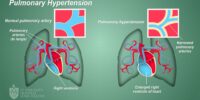Can Hypertension Lead To Heart Disease?

Hypertension, commonly known as high blood pressure, is a prevalent medical condition affecting a substantial portion of the global population. Its association with heart disease has been extensively studied due to the significant impact it has on cardiovascular health. This article aims to delve into the relationship between hypertension and heart disease, exploring the potential complications that arise from sustained high blood pressure and the symptoms indicative of their presence.
Additionally, the article will discuss the diagnostic and treatment approaches employed for managing hypertension and heart disease, including the importance of lifestyle modifications in preventing their development. Furthermore, emphasizing the significance of early intervention and prevention strategies in mitigating the adverse effects of these conditions will also be addressed.
By examining the link between hypertension and heart disease, this article seeks to enhance understanding and awareness of the potential consequences of uncontrolled high blood pressure, highlighting the importance of proactive measures in maintaining cardiovascular health.
Key Takeaways
- Hypertension management requires a combination of medication and lifestyle changes.
- A balanced diet and regular exercise are essential for managing hypertension and reducing the risk of heart disease.
- Stress management techniques such as meditation and hobbies can help lower hypertension and heart disease risk.
- Regular monitoring and early detection of hypertension are crucial in preventing the development of heart disease.
Understanding Hypertension and Heart Disease
The correlation between hypertension and heart disease can be represented as a direct link between elevated blood pressure levels and the development of cardiovascular complications.
Hypertension, or high blood pressure, is a chronic condition characterized by increased force exerted by the blood against the walls of the arteries. Over time, this increased pressure can damage the arteries, leading to the development of various heart diseases such as coronary artery disease, heart failure, and stroke.
Understanding the risk factors associated with hypertension is crucial in preventing the development of heart disease. Risk factors include age, family history, smoking, obesity, and a sedentary lifestyle.
Implementing hypertension prevention strategies such as maintaining a healthy diet, engaging in regular physical activity, limiting alcohol consumption, and managing stress can help reduce the risk of heart disease in individuals with hypertension.
The Link Between High Blood Pressure and Cardiovascular Issues
One possible sentence could be: ‘The correlation between elevated blood pressure levels and cardiovascular complications is a subject of considerable scholarly interest.’
Hypertension, or high blood pressure, has long been recognized as a major risk factor for heart disease. Understanding the relationship between hypertension and cardiovascular issues is crucial for developing effective prevention methods.
Studies have shown that persistently high blood pressure can lead to the development of atherosclerosis, a condition characterized by the buildup of plaque in the arteries. This plaque buildup can restrict blood flow to the heart, leading to various cardiovascular complications such as coronary artery disease, heart attack, and stroke.
Additionally, hypertension can also cause the heart to work harder to pump blood, leading to an enlarged heart or heart failure. Therefore, managing hypertension through lifestyle changes, medication, and regular monitoring is essential in preventing heart disease.
Complications of Hypertension on the Heart
This paragraph discusses the complications of hypertension on the heart, specifically focusing on hypertensive heart disease and coronary artery disease.
Hypertensive heart disease refers to a group of heart conditions that occur as a result of high blood pressure, including left ventricular hypertrophy and heart failure.
Coronary artery disease is a common complication of hypertension, characterized by the narrowing and hardening of the arteries that supply blood to the heart, which can lead to heart attacks and other cardiovascular events.
Hypertensive heart disease
Hypertensive heart disease is a potential consequence of hypertension. It refers to a group of heart conditions that are caused or worsened by high blood pressure.
Hypertension exerts a detrimental impact on heart health by placing excessive strain on the heart and blood vessels. Over time, this increased workload on the heart leads to structural changes and functional abnormalities.
The most common manifestation of hypertensive heart disease is left ventricular hypertrophy, which is characterized by the thickening of the heart muscle. This condition impairs the heart’s ability to pump blood effectively, leading to symptoms such as shortness of breath, fatigue, and chest pain.
Additionally, hypertension can also lead to the development of other cardiac conditions, including coronary artery disease, heart failure, and arrhythmias.
Therefore, it is crucial to effectively manage hypertension to prevent the progression of hypertensive heart disease and its associated complications.
Coronary artery disease and hypertension
Coronary artery disease, often associated with high blood pressure, is a condition characterized by the narrowing and hardening of the arteries that supply blood to the heart.
Hypertension, or high blood pressure, can contribute to the development and progression of coronary artery disease. The increased pressure within the arteries can damage the blood vessel walls, leading to the formation of plaques. These plaques can cause the arteries to become narrowed and eventually blocked, reducing blood flow to the heart.
Managing hypertension is crucial in preventing or slowing down the progression of coronary artery disease. Lifestyle modifications, such as maintaining a healthy weight, regular exercise, a low-sodium diet, and limited alcohol consumption, are important for managing hypertension. Additionally, medication therapy may be prescribed to control blood pressure levels and reduce the risk of coronary artery blockage in individuals with hypertension.
Recognizing the Symptoms of Hypertension and Heart Disease
Recognizing the symptoms and early warning signs of hypertension and heart disease is crucial in order to prevent further complications and potentially devastating outcomes.
Hypertension, or high blood pressure, is often asymptomatic, making it difficult to detect without regular check-ups. However, some individuals may experience symptoms such as headaches, dizziness, and blurred vision.
On the other hand, heart disease can present with symptoms like chest pain, shortness of breath, and fatigue. It is important to note that these symptoms can vary among individuals, and some may not experience any symptoms at all.
Prompt recognition of these symptoms is essential for early intervention and treatment. Lifestyle modifications, such as regular exercise, a healthy diet, and stress reduction, can help manage hypertension. For heart disease, treatment options may include medications, surgical interventions, or lifestyle changes, depending on the severity and underlying causes.
Overall, recognizing the symptoms of hypertension and heart disease is crucial for timely intervention and improved outcomes.
Diagnosing and Treating Hypertension and Heart Disease
This paragraph discusses the methods for diagnosing hypertension, as well as the medications and lifestyle changes used for managing hypertension and preventing heart disease.
Diagnosing hypertension typically involves measuring blood pressure using a sphygmomanometer, and it may also include additional tests to identify any underlying causes.
Medications such as diuretics, beta blockers, and ACE inhibitors are commonly prescribed to manage hypertension, while lifestyle changes such as adopting a healthy diet, engaging in regular physical activity, and quitting smoking can also help prevent heart disease.
Methods for diagnosing hypertension
One reliable method for diagnosing hypertension involves measuring blood pressure using a sphygmomanometer, which is a device that consists of an inflatable cuff and a pressure gauge. This method is commonly used in clinical settings and is relatively simple to perform.
However, it is important to note that blood pressure measurements can vary throughout the day and can be influenced by factors such as stress and physical activity. To overcome this limitation, ambulatory blood pressure monitoring (ABPM) can be utilized. ABPM involves wearing a portable device that automatically measures blood pressure at regular intervals over a 24-hour period.
This method provides a more comprehensive assessment of blood pressure patterns and can help identify individuals who have ‘white coat hypertension’ (elevated blood pressure in a clinical setting only) or ‘masked hypertension’ (normal blood pressure in a clinical setting but elevated at other times).
By incorporating both traditional blood pressure measurements and ABPM, healthcare professionals can obtain a more accurate diagnosis of hypertension.
Medications and lifestyle changes for managing hypertension and preventing heart disease
Utilizing a combination of pharmacological interventions and lifestyle modifications has been shown to effectively manage elevated blood pressure and reduce the risk of cardiovascular complications. Medications used for treating hypertension include diuretics, beta-blockers, ACE inhibitors, angiotensin receptor blockers, and calcium channel blockers. These medications work by either reducing the volume of blood or relaxing blood vessels, thereby lowering blood pressure. In addition to medications, lifestyle changes such as adopting a healthy diet, maintaining a healthy weight, engaging in regular physical activity, limiting alcohol intake, and quitting smoking are crucial in managing hypertension. These lifestyle modifications have been found to complement medication therapy and further reduce the risk of developing heart disease. Moreover, alternative therapies such as acupuncture, yoga, and meditation have been explored as adjunctive approaches for hypertension management. Although more research is needed to fully understand their efficacy, these alternative therapies may offer additional benefits in preventing hypertension complications.
| Medications | Mechanism of Action | Examples |
|---|---|---|
| Diuretics | Increase urine output | Hydrochlorothiazide |
| Beta-blockers | Reduce heart rate | Atenolol, metoprolol |
| ACE inhibitors | Block enzyme | Lisinopril, enalapril |
| Calcium channel blockers | Relax blood vessels | Amlodipine, nifedipine |
Lifestyle Changes to Prevent Hypertension and Heart Disease
Implementing lifestyle changes such as maintaining a healthy diet and exercising regularly plays a crucial role in preventing hypertension and heart disease. These changes can help individuals reduce their risk factors and improve overall cardiovascular health.
Here are three key lifestyle changes that can effectively prevent hypertension and heart disease:
- Consuming a balanced diet: Incorporating a diet rich in fruits, vegetables, whole grains, lean proteins, and low-fat dairy products can lower blood pressure and cholesterol levels. Limiting the intake of sodium, saturated fats, and added sugars is also beneficial.
- Regular physical activity: Engaging in regular exercise, such as brisk walking, cycling, or swimming, can strengthen the heart and improve blood circulation. Exercise helps maintain a healthy weight, lowers blood pressure, and reduces the risk of developing heart disease.
- Managing stress: Chronic stress can contribute to hypertension and heart disease. Implementing stress management techniques like meditation, deep breathing exercises, and engaging in hobbies can help reduce stress levels and promote cardiovascular health.
By adopting these lifestyle changes, individuals can effectively prevent hypertension naturally and reduce the risk of heart disease.
Monitoring and Managing Hypertension and Heart Disease
Regular check-ups and blood pressure monitoring play a crucial role in the management of hypertension and heart disease. These routine visits allow healthcare professionals to assess the patient’s overall health and monitor any changes in blood pressure levels.
Additionally, early detection of hypertension can help prevent the development of heart disease.
When it comes to treating heart disease associated with hypertension, there are various options available, including lifestyle modifications, medication, and surgical interventions. The choice of treatment depends on the severity of the condition and the individual’s specific needs.
Regular check-ups and blood pressure monitoring
Blood pressure monitoring and regular check-ups are essential for the early detection and management of hypertension, which can lead to heart disease. Regular check-ups allow healthcare professionals to monitor blood pressure levels and assess any changes or potential risks. This proactive approach enables timely intervention and the implementation of appropriate treatment strategies. Additionally, regular check-ups provide an opportunity for patients to receive guidance on lifestyle modifications, such as adopting a healthy diet, engaging in regular physical activity, and managing stress, all of which contribute to the prevention and management of hypertension. Blood pressure management involves various strategies, including medication, lifestyle changes, and regular monitoring to ensure blood pressure remains within a healthy range. Monitoring blood pressure at home using a blood pressure monitor is a valuable tool that empowers individuals to take an active role in their own healthcare.
| Advantages of Blood Pressure Monitoring at Home | Disadvantages of Blood Pressure Monitoring at Home |
|---|---|
| Convenience | Potential for measurement error |
| Privacy | Inadequate training on proper usage |
| Cost savings | Lack of immediate medical support |
| Empowerment | Anxiety or stress related to self-monitoring |
| Early detection of abnormal blood pressure trends | Inability to detect other underlying conditions |
Treatment options for heart disease associated with hypertension
Treatment options for heart disease associated with hypertension include lifestyle changes, medications, and medical procedures.
Lifestyle changes include adopting a healthy diet low in sodium and saturated fats, engaging in regular physical activity, maintaining a healthy weight, and avoiding tobacco and excessive alcohol consumption. These changes can help lower blood pressure and reduce the risk of heart disease.
Medications such as antihypertensive drugs are commonly prescribed to manage hypertension and prevent complications like heart disease.
Additionally, medical procedures such as angioplasty and coronary artery bypass surgery may be recommended to restore blood flow to the heart and reduce the risk of further complications.
It is important for individuals with hypertension to work closely with their healthcare providers to develop a comprehensive treatment plan that includes both prevention methods and appropriate interventions for heart disease management.
The Importance of Early Intervention and Prevention
Early intervention and prevention play a crucial role in mitigating the risk of heart disease associated with hypertension. It is well-established that hypertension is a major risk factor for the development of heart disease, and therefore, identifying and managing hypertension early on is essential.
Early intervention strategies focus on identifying individuals with hypertension through regular blood pressure screenings, and implementing lifestyle modifications and pharmacological interventions to control blood pressure levels. Lifestyle modifications include adopting a healthy diet, engaging in regular physical activity, maintaining a healthy weight, limiting alcohol consumption, and avoiding tobacco use.
Pharmacological interventions may involve the use of antihypertensive medications, such as angiotensin-converting enzyme inhibitors or calcium channel blockers.
Prevention strategies aim to educate individuals about the importance of blood pressure control and the risks associated with hypertension. By promoting early intervention and prevention, the incidence and progression of heart disease associated with hypertension can be significantly reduced.
Frequently Asked Questions
Are there any alternative treatments for hypertension and heart disease besides medications?
Alternative therapies and lifestyle modifications can be effective in managing hypertension and heart disease. These approaches include exercise, dietary changes, stress reduction techniques, weight management, and avoiding smoking and excessive alcohol consumption.
Can stress and anxiety worsen hypertension and increase the risk of heart disease?
Stress and anxiety can worsen hypertension and increase the risk of heart disease. Stress management techniques and lifestyle modifications, such as regular exercise, healthy diet, and adequate sleep, are essential in managing these conditions.
Is there a specific age group that is more prone to developing hypertension and heart disease?
Certain age groups, such as individuals over the age of 65, are more susceptible to developing hypertension and subsequently being at an increased vulnerability for heart disease.
Can hypertension and heart disease be hereditary?
Hypertension and heart disease can have a hereditary risk due to genetic factors. Genetic variations can contribute to the development of both conditions, increasing the likelihood of their occurrence in certain individuals.
Are there any natural remedies or supplements that can help lower blood pressure and prevent heart disease?
There are several natural remedies and lifestyle changes that can help lower blood pressure and prevent heart disease, such as regular exercise, a healthy diet, stress reduction techniques, and supplements like garlic extract and omega-3 fatty acids.









